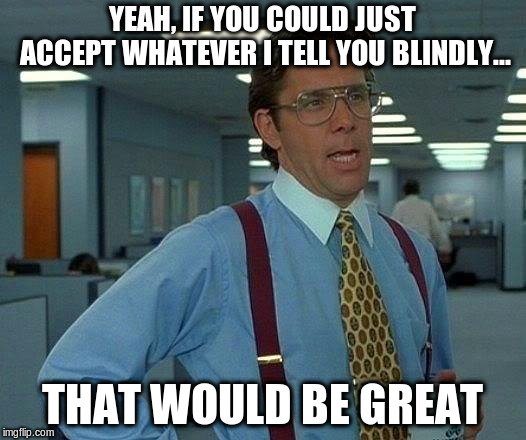No Friday Rundown this week. Long story short, I did a lot of work formatting paperbacks. More details on Monday. But I wanted to write something in response to a Minds blog, and figured I would also post it here on Steemit for those who are interested. Here it is.

I think today I will break holding pattern, and actually write a response to someones post that I largely agree with. Let's get metaphysical. Let's talk about Free Will.
(Post I'm referencing here.)
This is one of those topics that I never had much issue with. I enjoy talking about it, but unlike some other topics, it doesn't really get an emotional reaction from me. It does seem to bother other people, though. And I'm pretty familiar with the reasons why, as is the person who wrote the original blog that prompted this post.
Free Will is one of those things that is hard, if not impossible, to prove, like the existence of a god. I've met people who are staunchly anti-religious, but only a couple of minutes of questioning is all I need to get them to admit it is entirely feasible that an all-powerful entity exists who created reality as we perceive it. It's quite remarkable watching an atheist do a complete 180 on such a fundamental belief without actually realizing what happened. Free Will is similar to this; people who claim that Free Will definitively doesn't exist will immediately fill that declaration with caveats, making statements filled with quantum mechanics mumbo jumbo. Maybe they actually are quantum physicists, but I think the more likely possibility is they know exactly as much about quantum mechanics as I do, and just want to find some way to acknowledge Free Will in some form without fully accepting it.
But if it's hard to prove one way or the other, where does that leave us? The way I see it, we need to attack an abstract problem like this with a more creative approach. Let's consider the following:
How would morality work under a system where participants do NOT have free will?
If someone breaks some rule, it cannot be the fault of that individual. Without Free Will, the environment that creates that person is at fault. No amount of individual initiative can prevent criminal behavior given a set of environmental factors, as it is entirely the environment and society at large that determines their actions. Some might object to this, but the logic is very straight forward. If Free Will does not exist, then the environment plus biological processes are entirely responsible for an individual's behavior.
As an aside, I believe this is why many people wish to believe in the lack of Free Will. If you are not a free agent, you can't be held responsible for your failings. This lets people off the hook, morally speaking. Same thing with god; if there is no supreme authority, then you can't be judged. Denying it is a great way to avoid responsibility. But I digress...
Of course, most people who have a cursory understanding of psychology know this is a toxic way of thinking. The people who are incompetent, unreliable, or downright malicious always have an excuse for everything. It is always someone or something else's fault when things go wrong. It is the people who can take responsibility that are better suited for positions of power. It is the people who own their mistakes that are able to face them to properly move forward towards sustainable success instead of constantly passing the buck. So, there is evidence that believing oneself to be in control of one's own actions just happens to make one better equipped to operate in the world.
But with all of that said, how does morality work under a system where participants DO have free will?
Well, it's basically the system of morality most people function under now. You are responsible for your actions. If you commit a crime, you are the one who receives punishment. If you do something positive, you are the one given credit and whatever rewards that behavior might entail. There is no mental gymnastics necessary to square this with reality; in fact, reality meshes with it rather well.
So, which is more likely... Free Will doesn't exist, but we just happen to experience better results in every conceivable sphere if we act as if it does? Or instead, it does exist, and that is why acting under that assumption works so well in terms of finding long lasting success and happiness? Personally, I tend to believe in philosophical principles that match up well with observable reality. Other people are free to think otherwise, but the cognitive dissonance that results from deliberately ignoring what evidence we do have on the matter is likely to cause some agitation.
Post on Minds